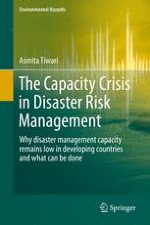2015 | OriginalPaper | Buchkapitel
7. Breaking the Capability Trap
verfasst von : Asmita Tiwari
Erschienen in: The Capacity Crisis in Disaster Risk Management
Aktivieren Sie unsere intelligente Suche, um passende Fachinhalte oder Patente zu finden.
Wählen Sie Textabschnitte aus um mit Künstlicher Intelligenz passenden Patente zu finden. powered by
Markieren Sie Textabschnitte, um KI-gestützt weitere passende Inhalte zu finden. powered by
